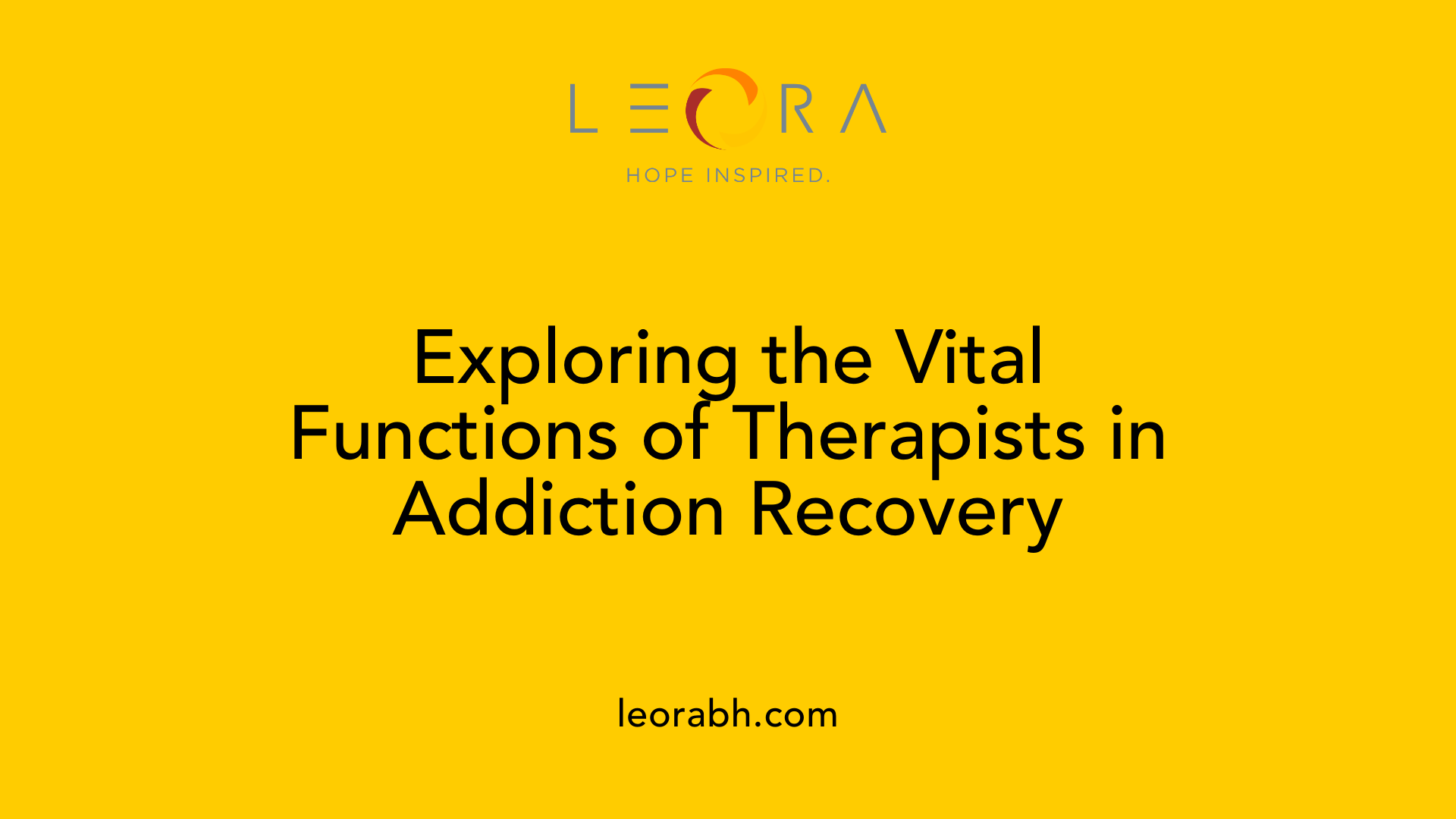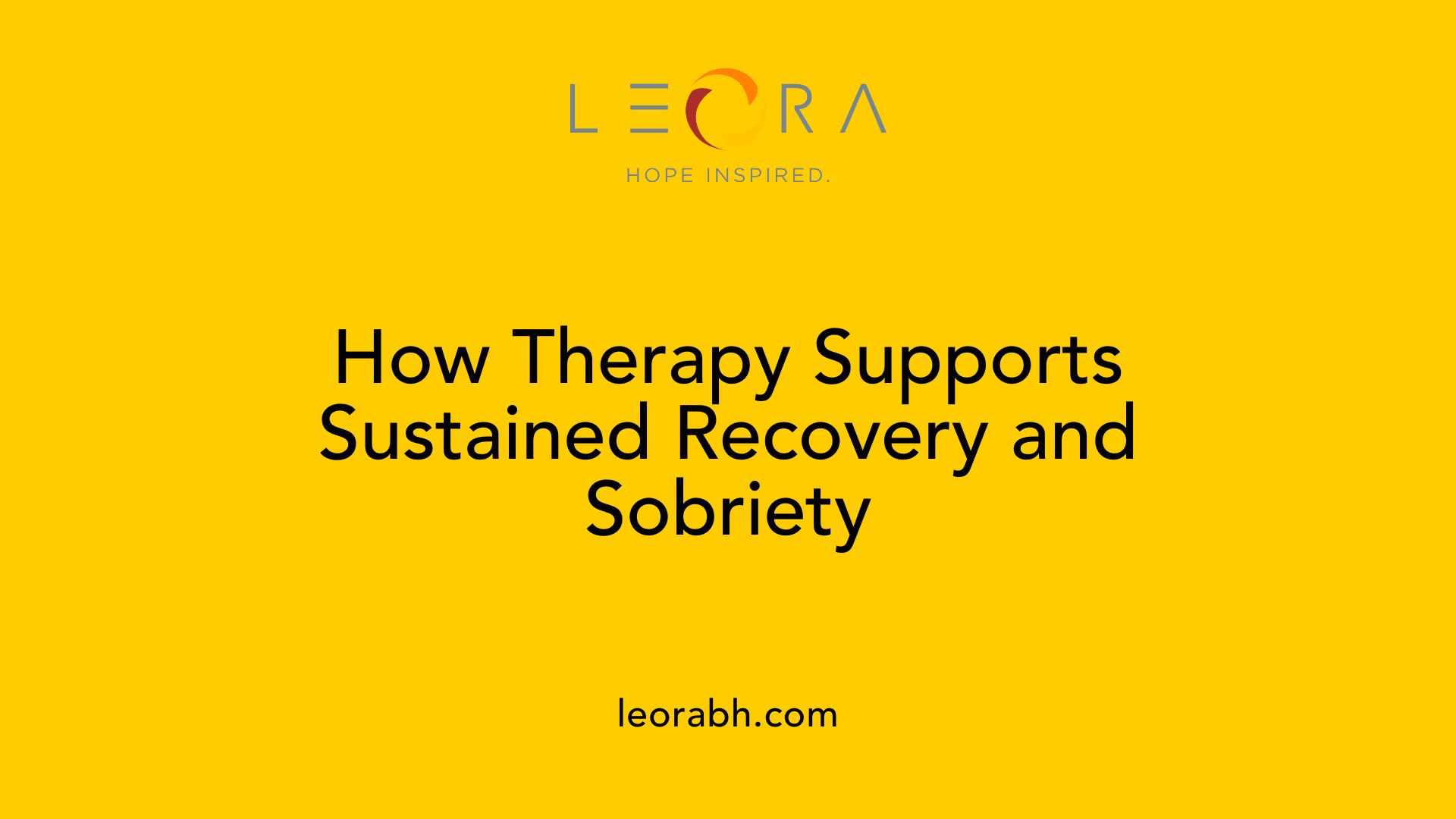How therapy and counseling can support individuals in recovery
The Role of Therapy in Navigating Addiction Recovery
Introduction
Addiction recovery is a complex journey that requires a multifaceted support system. Therapy and counseling play crucial roles in assisting individuals as they work through the challenges of recovery from substance use disorders. This article explores the diverse ways in which professional therapeutic interventions can aid those in recovery, addressing mental health issues, fostering personal growth, and enhancing long-term sobriety.
The Multifaceted Role of Therapists in Recovery

What is the role of a therapist in addiction recovery?
The role of a therapist in addiction recovery is multifaceted, providing essential guidance and support throughout the healing process. Therapists foster a collaborative and safe environment where clients can explore their thoughts, feelings, and behaviors, which is crucial for personal growth.
Therapists employ various techniques to enhance recovery:
- Cognitive-Behavioral Therapy (CBT) helps clients recognize and modify negative thought patterns, teaching them healthier coping mechanisms.
- Dialectical Behavior Therapy (DBT) combines cognitive-behavioral techniques with mindfulness, promoting emotional regulation and interpersonal effectiveness.
- Psychodynamic therapy, on the other hand, delves into unresolved conflicts stemming from past experiences, encouraging self-awareness and promoting personal growth.
In the therapeutic relationship, empathy and active listening are crucial. These skills help establish trust, allowing clients to feel safe in discussing their challenges. Therapists also support clients in recognizing triggers for addiction, thereby enhancing their coping strategies to manage cravings effectively.
Furthermore, therapy strengthens interpersonal relationships by improving communication skills, resolving conflicts, and fostering deeper connections with others through a supportive network. This holistic approach not only aids in addiction recovery but also contributes to overall emotional well-being, essential for a sustainable recovery journey.
How Therapy Assists Individuals Facing Addiction

How can therapy assist individuals facing addiction?
Therapy plays a pivotal role in treating addiction by offering a safe and non-judgmental environment for individuals to explore their feelings and behaviors related to substance use. Through various therapeutic methods like Cognitive Behavioral Therapy (CBT), individuals can recognize and challenge the negative thought patterns that contribute to their addiction. Additionally, therapy can help manage co-occurring mental health issues, such as anxiety and depression, which are common among those facing addiction.
The therapeutic relationship is crucial in this process. Establishing trust and rapport allows clients to feel more comfortable discussing their hardships. This supportive framework encourages personal growth and fosters resilience, which is vital for maintaining sobriety. By addressing both the emotional and behavioral aspects of addiction, therapy enhances the development of healthier coping strategies and empowers individuals to make lasting changes in their lives.
Creating a supportive space
Creating a supportive therapeutic environment is essential for effective recovery. Such a space allows individuals to express their feelings without fear of judgment or ridicule. This emotional security enables clients to process feelings of guilt, shame, or insecurity that often accompany addiction.
Therapy also facilitates open discussions about the impact of relationships on addiction, guiding clients to identify supportive or enabling dynamics in their lives. Group sessions, in particular, foster peer connections that provide additional layers of support and accountability—important factors in navigating the recovery journey successfully.
Overall, therapy provides the necessary tools and strategies to help individuals face their challenges head-on, ultimately enhancing their quality of life as they work towards overcoming addiction.
Diverse Therapeutic Approaches Available

What are the different therapeutic approaches available for addiction treatment?
There are several therapeutic approaches utilized in the treatment of addiction, each tailored to meet individual needs and enhance recovery outcomes. Here’s a closer look at the diverse approaches:
| Therapeutic Approach | Description | Key Benefits |
|---|---|---|
| Cognitive Behavioral Therapy (CBT) | Focuses on altering negative thought patterns and behaviors, equipping individuals with skills to cope with triggers. | Improves self-awareness and emotional response. |
| Dialectical Behavior Therapy (DBT) | Combines cognitive-behavioral techniques with mindfulness, helping users improve emotional regulation and relationships. | Enhances coping strategies and interpersonal skills. |
| Motivational Interviewing (MI) | Encourages individual motivation for change by exploring ambivalence and developing commitment to treatment. | Strengthens motivation and decreases resistance. |
| Holistic Therapies | Includes methods like yoga and art therapy, focusing on creative expression and mindfulness for emotional health. | Promotes overall well-being and relaxation. |
| Family Therapy | Addresses relational issues and enhances communication within families impacted by addiction. | Strengthens familial ties and reduces conflict. |
| Group Therapy | Provides peer support dynamics, allowing individuals to share experiences and learn from one another. | Fosters accountability and connection with others. |
| Medication-Assisted Treatment (MAT) | Combines medications with counseling to alleviate withdrawal symptoms and curb cravings effectively. | Supports physiological needs while enhancing recovery. |
Each of these methods plays a crucial role in a comprehensive recovery plan, significantly improving the effectiveness of addiction treatment by addressing both psychological and social elements of recovery.
The Importance of a Strong Therapeutic Relationship

What is the importance of the therapeutic relationship in recovery?
The therapeutic relationship plays a pivotal role in addiction recovery as it fosters an environment of trust, support, and motivation essential for effective therapy. When counselors build strong bonds with their clients, characterized by collaboration and shared goals, it leads to enhanced treatment engagement and retention, especially for individuals dealing with substance use disorders.
Research highlights that better relationships with sponsors in 12-step programs, such as Alcoholics Anonymous (AA), correspond with higher rates of abstinence and increased meeting attendance. This illustrates that the therapeutic alliance extends beyond traditional therapy settings and influences broader recovery frameworks.
A solid therapeutic relationship not only supports emotional well-being but also significantly impacts treatment outcomes. Clients who feel genuinely understood and supported by their counselors are more likely to commit to their recovery journey.
Impact of strong counselor-client bonds
Counselor-client bonds can enhance the recovery process in profound ways. When individuals feel safe discussing their thoughts and emotions without judgment, they can more effectively explore the complex issues contributing to their addiction. It is in this supportive environment that clients can confront feelings of shame, guilt, and low self-esteem, which can hinder their recovery.
The accountability fostered through a reliable therapeutic relationship encourages clients to take ownership of their recovery journey. This promotes personal growth and encourages individuals to set and achieve goals beyond mere sobriety, ultimately contributing to a more fulfilling life.
In summary, the therapeutic relationship is vital, not just for addressing addiction but also for enhancing overall well-being. With trust and mutual respect at its core, this alliance empowers individuals to navigate their recovery successfully.
Therapy's Contribution to Long-Term Sobriety

How does therapy contribute to long-term sobriety?
Therapy plays a pivotal role in achieving and maintaining long-term sobriety by addressing underlying issues that often contribute to substance use disorders. These issues may include trauma, anxiety, and depression. By offering effective coping strategies and resilience-building techniques, therapy equips individuals with the tools necessary to navigate the challenges of recovery.
One of the cornerstones of therapeutic intervention is Cognitive Behavioral Therapy (CBT). CBT helps clients identify and change negative thought patterns and behaviors that could lead to relapse. Through structured sessions, individuals learn healthier behaviors and coping mechanisms that reinforce their recovery journey.
Moreover, therapy fosters a supportive environment for individuals. It acts as a safe space where they can share their experiences, express feelings, and forge connections with others in recovery. This sense of community reduces isolation, making the recovery journey less daunting.
Additionally, ongoing engagement in therapy is crucial for developing personalized relapse prevention plans. Counselors guide clients in recognizing potential triggers and cravings, equipping them with strategies to manage these challenges. Regular therapy sessions help reinforce these strategies, further improving the chances of sustained recovery.
Strategies for sustained recovery
Therapy emphasizes a variety of strategies designed to promote sustained recovery, including:
- Relapse Prevention Planning: Collaboratively created strategies that help individuals anticipate triggers and design coping mechanisms.
- Developing Healthy Coping Skills: Incorporating mindfulness techniques, communication skills, and emotional regulation strategies.
- Building Support Networks: Establishing connections with peers, families, and community support systems.
- Continuous Self-Reflection: Encouraging ongoing exploration of emotions, thoughts, and behavioral patterns to foster personal growth and resilience.
Therapeutic Interventions for Relapse Prevention
Role of counselors in creating relapse plans
Counselors play a pivotal role in developing personalized relapse prevention plans for clients. This involves assessing each individual’s specific triggers, past relapses, and unique challenges related to their recovery journey. By collaborating with clients, counselors can empower them to recognize early warning signs and establish coping mechanisms that are crucial for maintaining sobriety.
Key strategies in maintaining sobriety
To effectively maintain sobriety, several key strategies can be implemented:
- Identifying Triggers: Counselors assist clients in recognizing personal triggers, such as stressors or social situations that may lead to cravings.
- Developing Coping Skills: Clients learn various coping strategies, including mindfulness techniques and healthy communication skills, to manage cravings and emotions.
- Building Support Networks: Engagement in support groups and fostering relationships with sober peers provide essential accountability and encouragement.
- Setting Personal Goals: Counselors encourage clients to set goals that extend beyond sobriety, reinforcing their sense of purpose and motivation.
Integrating these elements while continuously monitoring and adjusting the relapse prevention plan can significantly improve clients' chances of long-term recovery.
Navigating the Recovery Process with Therapy
Addressing Emotional and Mental Health
Therapy serves as a pivotal aspect of addiction recovery, where a safe and non-judgmental environment helps individuals explore underlying emotional issues. It allows clients to express feelings of shame, guilt, or low self-esteem, which can significantly impact their journey to sobriety. Various therapeutic approaches—such as Cognitive-Behavioral Therapy (CBT), Dialectical Behavior Therapy (DBT), and Psychodynamic Therapy—focus on enhancing self-awareness, addressing mental health conditions like anxiety and depression, and improving coping strategies for managing triggers and cravings.
Individual counseling plays a critical role, especially early on, offering a confidential space to reflect on personal challenges. Regular therapy sessions support individuals in building essential skills while establishing accountability in their recovery process.
Supporting Personal Growth Beyond Addiction
In addition to addressing addiction directly, therapy fosters personal growth. Counselors help clients set personal goals beyond sobriety, allowing them to discover new interests and develop skills that contribute to a fulfilling life. By enhancing their self-esteem and fostering empowerment, therapy encourages individuals to identify their values and strengths, thus promoting informed decision-making.
Moreover, establishing a strong therapeutic alliance fosters trust and understanding, essential for successful outcomes in recovery. Through ongoing support, therapy can significantly improve interpersonal relationships and provide a framework for individuals to navigate their recovery journey with greater resilience.
Community and Purpose: Expanding Horizons in Recovery
Engaging in meaningful activities
Counselors play a vital role in helping clients find purpose during their recovery journey. Engaging in meaningful activities, such as volunteering or pursuing hobbies, can significantly enhance an individual’s sense of identity and fulfillment. Activities that resonate with one's passions not only distract from cravings but also foster a positive self-image that reinforces recovery.
By encouraging clients to explore educational and job opportunities, counselors empower them to envision a future beyond substance use. This process helps clients build self-esteem and develop a narrative that highlights their capabilities, fostering resilience against relapse.
Building a robust support network
Community support is essential for sustaining recovery. Counselors can facilitate connections with mutual-help groups and recovery organizations, strengthening the social ties that are crucial during this transformative period. Being part of a supportive community offers shared experiences and encouragement, which can significantly mitigate feelings of isolation or shame.
A robust support network enhances individuals' sense of belonging, making recovery feel less daunting. Counselors guide clients in nurturing these relationships, allowing them to receive emotional support and practical advice from peers who understand their journey. This strengthens the bonds among individuals in recovery and fosters an environment where they can thrive.
Conclusion
The journey to recovery from addiction is challenging, but therapy and counseling provide invaluable support to those seeking sobriety. By addressing the root causes of addiction, fostering supportive relationships, and enhancing personal resilience, therapy plays a crucial role in maintaining long-term recovery. Whether through individualized sessions or group settings, therapeutic interventions offer a pathway to personal growth, healthier relationships, and a fulfilling life beyond substance use. Embracing therapy as part of addiction recovery not only empowers individuals to navigate their challenges but also lays the foundation for sustained well-being and sobriety.
References
- Chapter 4—Counseling Approaches for Sustaining Recovery ... - NCBI
- The importance of therapy during addiction recovery | News
- The Role of the Substance Abuse Counselor in Addiction Recovery
- What is the role of therapy and counseling in addiction treatment?
- 5 Benefits of Talk Therapy for Addiction - The Canyon at Santa Monica
- How Therapy Can Support Traditional Addiction Recovery Programs
- Therapy For Addiction Recovery
- The Power Of Individual Counseling In Recovery - How It Can Help ...
- Chapter 2—Framework for Supporting Recovery With Counseling
- Counseling and Substance Use Disorders
Find Your Inner Light
Related Articles
Contact Us
Leora Behavioral Health offers a comprehensive addiction treatment programs to help you get your life back on track.
Our trained professionals will work with you to develop a personalized treatment plan that meets your unique needs. If you or someone you know is struggling with addiction, reach out to Leora Behavioral Health today.


.svg)





.svg)
.svg)
.svg)
.svg)